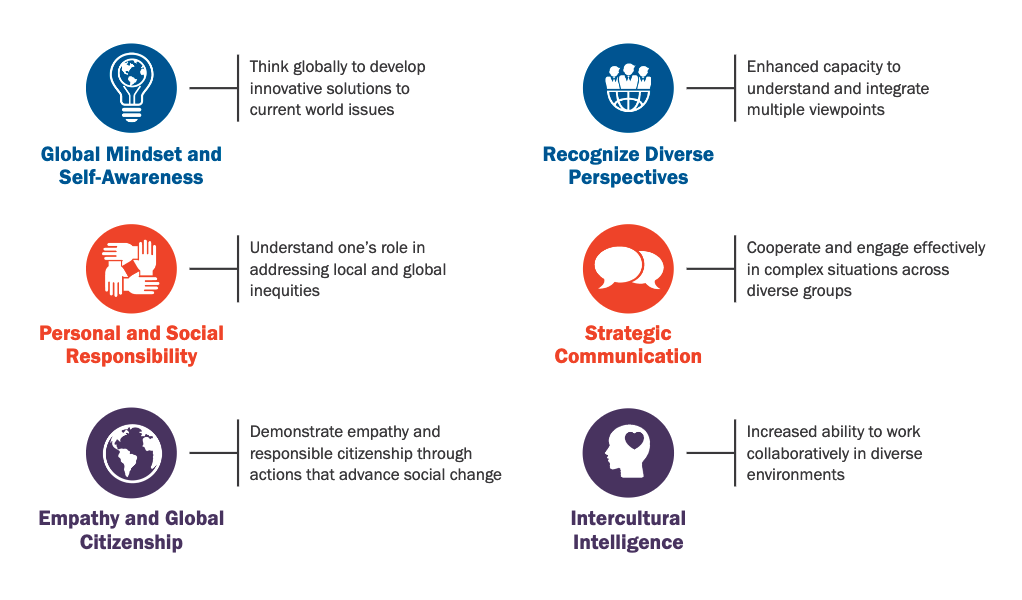Program Learning Outcomes and Curriculum
Your program curriculum is designed to ensure graduates acquire the essential skills, knowledge, and attitudes appropriate and relevant to both the needs of students and employers.
Your program has several key components that include:
- Program Vocational Learning Outcomes
- Ministry Program Learning Outcomes
- Essential Employability Skills Outcomes
- Global Citizenship and Equity Learning Outcomes
- General Education (GNED) course in Level 3
Program Vocational Learning Outcomes
Program vocational learning outcomes describe what graduates of the program have demonstrated they can do with the knowledge and skills they have achieved during their studies. The outcomes are closely tied to the needs of the workplace. Through assessment (e.g., assignments and tests), students verify their ability to reliably perform these outcomes before graduating.
- Analyze the influence of social and natural forces on historical and contemporary issues and events at a level required by colleges, universities and the workplace.
- Communicate competently at a level required for postsecondary studied, showing flexibility and clarity of thought and expression.
- Examine and evaluate various aspects of our changing society to assist in developing a sense of personal and social responsibility as a citizen in society.
- Apply basic vocational skills drawn from various post-secondary courses to develop knowledge and skills relevant to specific industries.
- Conduct research and write essays according to academic conventions at a level required by colleges, universities, and the workplace
Ministry Program Learning Outcomes
As a graduate of this program, you will reliably demonstrate the ability to:
- Develop, through general knowledge gained in a wide range of subjects, insight into both self and society.
- Develop flexibility and clarity of both thought and expression in order to develop communications competence to a level required by business and industry.
- Understand and utilize critical thinking processes and problem solving techniques.
- Examine and evaluate various aspects of our changing society to assist in developing a sense of personal and social responsibility as a citizen in society.
- Employ basic vocational, skills drawn from the areas of the Humanities, Social and Behavioural Sciences of Vocational Studies (Business, Technology).
Essential Employability Skills Outcomes
Essential Employable Skills (EES) are skills that, regardless of a student’s program or discipline, are critical for success in the workplace, in day-to-day living, and for lifelong learning. Each course in the program addresses two to four EES outcomes. Graduates will reliably demonstrate abilities in six skill categories:
Global Citizenship and Equity (GCE) Learning Outcomes
There are six Global Citizenship and Equity (GCE) learning outcomes integrated into Diploma and Advanced Diploma programs as a component of Centennial’s Signature Learning Experience (SLE). The SLE reflects the College’s promise to provide students with a distinctive and inclusive educational experience that builds on a foundation of global citizenship, equity, and social justice. Certificate and Graduate Certificates also include at least two GCE learning outcomes. The GCE learning outcomes are:
- Identify one’s role and responsibilities as a global citizen in personal and professional life.
- Identify beliefs, values and behaviours that form individual and community identities and the basis for respectful relationships.
- Analyze issues of equity at the personal, professional, and global level.
- Analyze the use of the world’s resources to achieve sustainability and equitable distribution at the personal, professional, and global level.
- Identify and challenge unjust practices in local and global systems.
- Support personal and social responsibility initiatives at the local, national, and global level.
Global Citizenship and Equity Portfolio
As a component of the SLE, Diploma and Advanced Diploma program students will complete the Global Citizenship and Equity (GCE) Portfolio. Building the GCE Portfolio is a process of documenting your GCE learning. Each item selected for inclusion in the portfolio demonstrates growth and understanding of Global Citizenship and Equity within your program of study.

Students are encouraged to develop their GCE Portfolio beginning in their first semester. You will add artifacts from coursework and accompanying reflections as well as artifacts arising from co-curricular activities, volunteering, etc. to your portfolio as you progress through the program. You are encouraged to develop an online professional portfolio presence through LinkedIn and/or other personal websites/blogs.
General Education (GNED) Courses
General Education (GNED) courses contribute to the development of citizens who are conscious of the diversity, complexity and richness of the human experience. Through General Education courses, students engage in learning that exposes them to at least one discipline outside their main field of study and increases their awareness of the society and culture in which they live and work.

